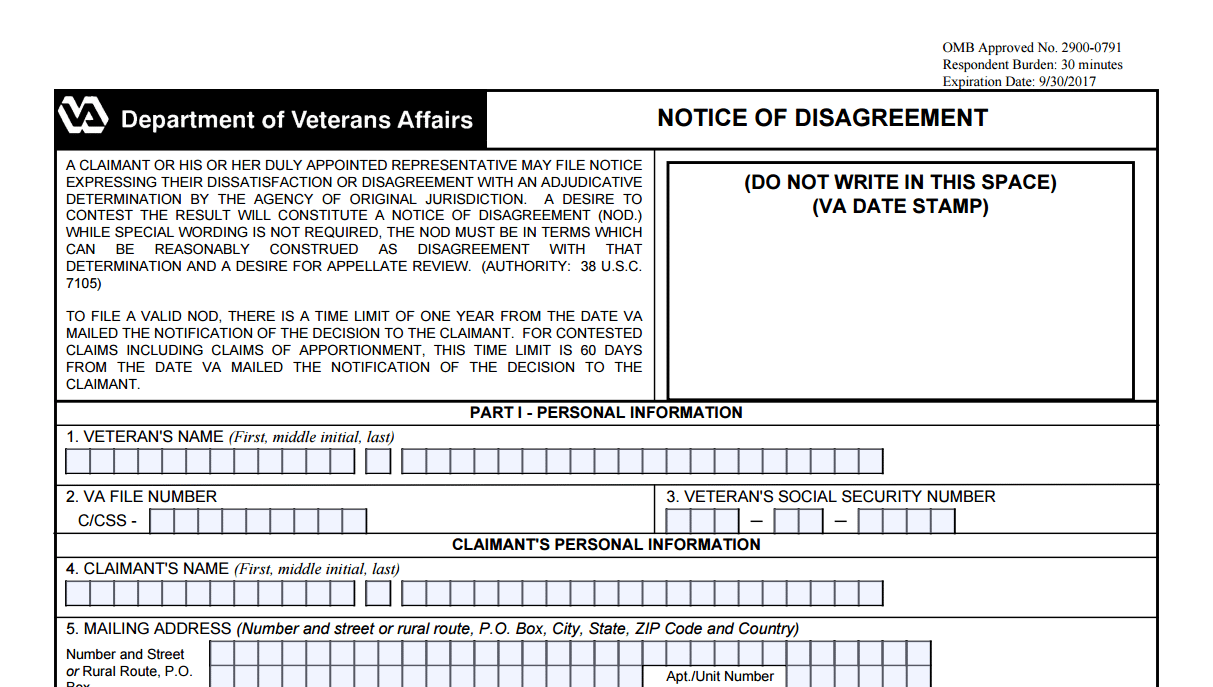When the VA regional office finally makes a decision in a case, it issues a rating decision to the veteran in which the VA attempts to explain the reasoning behind the decision. If the rating decision is incorrect in any way, the veteran has a right to appeal the decision within one year of the date that the decision was issued.
Filing a VA appeal is as simple as filling out and submitting the standard Notice of Disagreement (NOD) form 21-0958. Please note that VA now requires all notices of disagreement to be submitted on this form. Determining whether the rating decision is correct, however, can be a complicated undertaking. Here are some questions to ask yourself.
Do the Claims Decided by the VA Add Up With the Claims You Filed?
It’s a good idea to begin by looking at the claims that were decided in a particular rating decision. The first question to ask is whether the VA at least made some kind of a decision, either to grant, to deny, or to defer, on every issue for which the veteran filed a compensation claim. If the rating decision fails to address one of the claims the veteran has made, then that issue could still be pending and may need to be brought to the attention of the VA so that it does not fall through the cracks.
Is There an Issue That Needs to be Appealed?
Once every claim is accounted for, there are three primary reasons to file an appeal of a rating decision: if service connection was denied; if service connection was granted but the VA assigned a rating that was too low; or if the effective date assigned to the grant of service connection is incorrect. A veteran can appeal one or all of these three issues.
Did the VA Grant or Deny Service Connection?
The easiest mistake to spot is, of course, improper denial of service connection. If the VA denies service connection for a disease or disability which began during military service, was caused by or aggravated by military service, or was caused by or aggravated by an already service-connected disability, an appeal is warranted. Even if the VA grants service connection for a disability, however, the veteran must make sure that the VA granted the maximum benefits due to the veteran for that disability.
Does the Assigned Rating Reflect the Level of Disability?
Even if the rating decision grants service connection for a disability, an appeal may still be necessary. As a part of each rating decision, the VA provides a disability rating for each of a veteran’s service-connected disabilities. These ratings range from 100% total disability down to a non-compensable 0% rating in increments of 10% (i.e., 10%, 20%, 30%, etc.). It is important to compare the rating assigned by the VA with the VA’s rating criteria to make sure that the veteran is receiving the appropriate rating percentage for his disability.
In an effort to standardize and speed up the rating process, the VA now provides rating decisions which contain less detail than rating decisions from a few years ago. With almost every rating decision, however, the VA also files a rating sheet in the claims file which includes a list of each of the veteran’s service-connected disabilities, each of the disabilities for which service connection has been denied, and any special monthly compensation to which the veteran is entitled.
The veteran is not always provided with a copy of the rating sheet, but if the rating decision the veteran receives does not contain sufficient information to determine the rating criteria for a particular disability, I highly recommend requesting a copy of the rating sheet from the VA.
On the rating sheet, the VA provides a numeric code for each separate disability. These numbers, or diagnostic codes (DC), point the veteran a corresponding disease or disability in the VA’s rating schedule. The VA rating schedule (located in the Code of Federal Regulations) provides a list of symptoms or criteria which a disability must meet to warrant a certain rating. For example, suppose the rating decision assigns a rating of 10% for the veteran’s diabetes mellitus (DC7913).
If the veteran references DC 7913, he or she will see that a 10% rating is warranted if the veteran’s diabetes mellitus is “manageable by restricted diet only.” According to the rating code, a higher rating of 20% is warranted where the veteran’s diabetes mellitus is “requiring insulin and restricted diet, or; oral hypoglycemic agent and restricted diet.” If the veteran is taking insulin to treat his or her diabetes then an appeal is required because the veteran is entitled to a higher rating for this disability.
Did VA Assign the Earliest Possible Effective Date for the Grant of Service Connection or Increased Rating?
Finally, even if the VA correctly found that a veteran’s disability was service connected and assigned the appropriate rating for that disability, an appeal might be necessary if the VA did not assign the correct effective date for service connection. A veteran should check the rating decision to determine as of what date the VA service-connected (or assigned a particular rating to) a disability.
Again, this information is easy to obtain from the rating sheet if it cannot be found in the rating decision itself. With very few exceptions, the appropriate effective date for service connection of a disability is the date that the most recent claim was filed.
Alternatively, for entitlement to an increased rating, the effective date is often up to one year prior to filing of the claim. For claims that meet one of the exceptions to the rule, the effective date may go back all the way to the date that a prior denied claim was filed. If the effective date assigned by the VA is not as early as it should be, a veteran could be deprived of years of benefits, so this is also a crucial issue to review when evaluating a rating decision.




